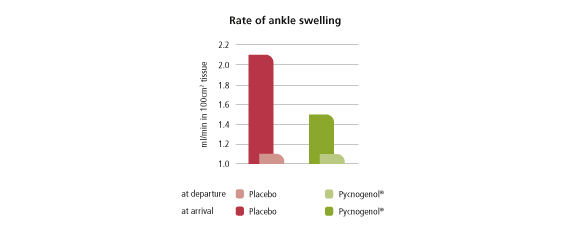Venous Disorders

Venous Disorders

Data source: Vascular Disease Foundation –CVI: What is it? – www.vdf.org
Have you ever noticed how heavy and swollen your legs, ankles or feet feel after a long airline flight or car ride? This discomfort occurs typically in people who have to sit or stand in a position for prolonged periods of time, and those who lack regular exercise. Perhaps you've experienced tight calves, restless legs or pain during walking. All of these symptoms are directly related to our overall vein health and comfort. According to Dr. Richard Passwater, a pioneer in Pycnogenol® research, one of the earliest discoveries about the extract was its ability to strengthen capillary walls - our bodies' tiniest blood vessels.

Pycnogenol® was shown in both pre-clinical and clinical studies to strengthen capillary walls and prevent edema. Research has shown Pycnogenol® actually seals the brittle capillaries and stops the outflow of blood into tissue which causes the swellings, edema and microbleedings. Coupled with its anti-inflammatory properties and patent for reducing platelet aggregation, these are the fundamental mechanisms of action behind Pycnogenol® for venous health.
In some cases, general leg swellings may progress to more serious chronic venous insufficiency (CVI) which can lead to complications and ulcerations if left untreated.
To date, 15 clinical studies with a total of 784 patients have been published on venous insufficiency and Pycnogenol. In fact, the high efficacy of Pycnogenol® as a venous insufficiency treatment was so obvious through numerous studies that it is regularly studied alongside other well known remedies for venous health. This is apparent in a German double-blind comparative study with 40 CVI patients. Pycnogenol® was shown to be more effective in a lower dosage in reducing edema of the lower limbs and alleviating the symptoms of CVI than horse chestnut seed extract.
Further, a clinical study involving 70 patients investigated the effect of Pycnogenol® in treating venous insufficiency versus troxerutine, a water-soluble derivative of rutine which is a common treatment for CVI. After 60 days of treatment, a combination of troxerutine coupled with Pycnogenol® produced more significant results in alleviating CVI symptoms than troxerutine alone.
As we navigate and rush through crowded airports, staying healthy becomes a priority. While traveling it is important to be conscious of our venous health.
Long periods of immobility, decreased fluid intake and water loss in dry compressed airplane cabins are contributing factors of swelling due to insufficient blood circulation, with fluids accumulating in tissues throughout the legs. Most people will notice the effects of in-flight swelling if they take their shoes off and have difficulty getting back into them at the end of the flight. Leg and ankle swelling can lead to dangerous conditions like Deep Vein Thrombosis.
One of the more recent clinical studies on swelling found that Pycnogenol® can have a positive effect on leg swelling (edema) during long airplane flights lasting 7-12 hours. Published in Clinical and Applied Thrombosis/Hemostasis, researchers tested in-flight ankle swelling of 169 participants and found that passengers who supplemented with Pycnogenol® experienced less leg and ankle swelling and discomfort. Both symptoms are commonly associated with long distance travel.

Other notable research includes a study of 211 passengers on a long-distance flight (7-12 hours) which demonstrated the ability of Pycnogenol® to help prevent thrombosis. Passengers took two 100 mg Pycnogenol® capsules two to three hours prior to departure and another two capsules six hours later during the flight. Another capsule was taken the following day after arrival. While there were five cases of thrombosis in the control group taking the placebo, none of the passengers supplementing with Pycnogenol® developed thrombosis during the flight.